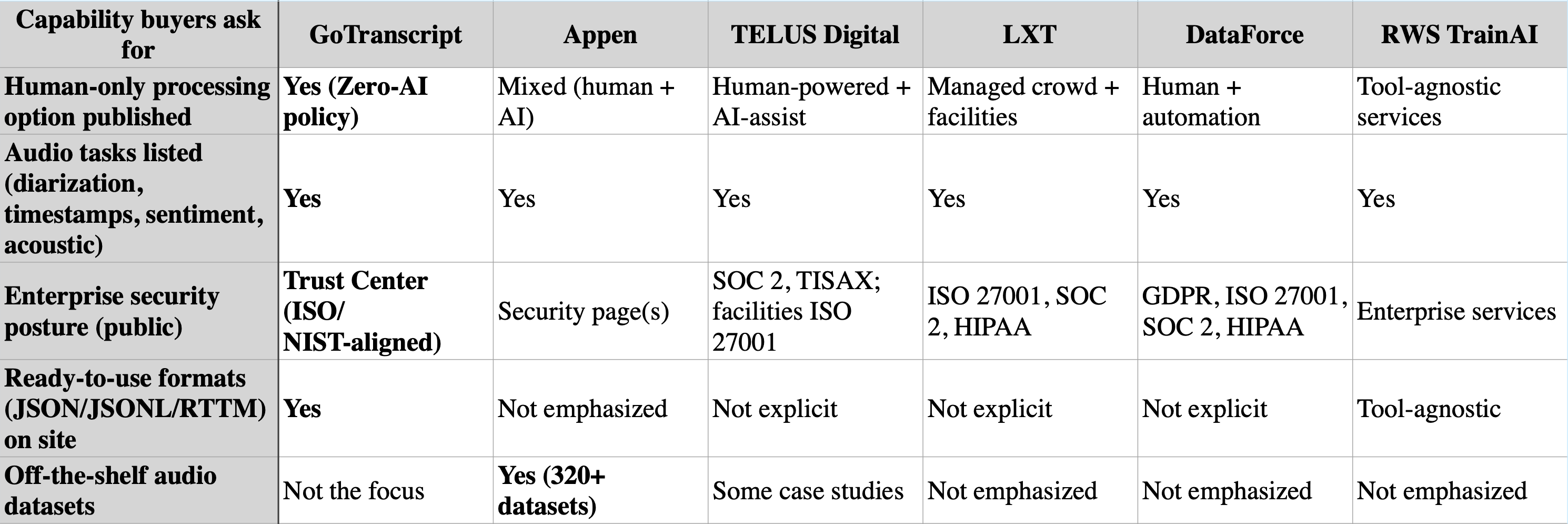Voice is exploding - LLM voice, agent assist, call‑center QA, in‑car assistants, and ambient clinical scribing all depend on human‑verified audio labels. Below is a practical buyer’s guide to the six strongest providers for human audio annotation today, with GoTranscript first and a clear view of where it outperforms others.
1) GoTranscript — Best for human‑only labeling with tight QA + enterprise security
Why it leads:
GoTranscript’s audio‑annotation service is built for human‑made labels (diarization, millisecond timestamps, sentiment/intent, acoustic events) and ships in JSON/JSONL/RTTM with a multi‑pass QA workflow and audit‑ready reports—all visible on the public service page.
Quality backbone:
The in‑house Precisa QMS underpins production with selective talent intake and a two‑pass human review on transcripts, measured against gold standards (WER). The same QA discipline is applied to labeling projects.
Security posture:
A published Trust Center details ISO/NIST‑aligned controls (SSO/MFA, least‑privilege, incident response) and a Human‑Only (Zero‑AI) processing policy for sensitive datasets—useful for regulated buyers.
Strengths vs. competitors:
-
Human‑only option on request (zero AI touching customer data).
-
Annotation‑ready deliverables (JSONL/RTTM) without extra integration work.
-
QA transparency (multi‑pass, gold tasks/consensus) baked into the service page, not just sales decks.
Best fit: enterprises needing human‑verified labels with auditability and security from pilot to thousands of hours.
2) Appen — Scale and off‑the‑shelf speech datasets
Appen covers the speech‑AI lifecycle (collection, transcription, audio annotation, evaluation) and highlights 320+ pre‑built audio datasets across 80+ languages (13,000+ hours), useful when you need to move fast or prototype.
Where GoTranscript stands out: for buyers who need human‑only processing plus explicit QA/SLAs and JSONL/RTTM‑first delivery, GoTranscript’s published specs are simpler to adopt. Appen’s positioning blends human + AI; GoTranscript emphasizes human‑verified outputs and security policy clarity.
3) TELUS Digital (TELUS International AI Data Solutions) — Enterprise programs & compliance
TELUS markets human‑powered data annotation at scale (claimed 1M+ annotators, 500+ languages/dialects) with AI‑assisted quality control and enterprise certifications (SOC 2, TISAX, facilities ISO 27001). Audio tasks include diarization, speaker ID, sentiment, segmentation.
Where GoTranscript stands out: TELUS is great for very large, blended programs; GoTranscript’s edge is human‑only workflows, lighter engagement overhead, and annotation‑native exports (JSON/JSONL/RTTM) documented directly on the service page.
4) LXT — Massive managed crowd + secure facilities
LXT offers enterprise‑managed audio annotation with a 7M+ global contributor network (via clickworker), multi‑layer QA, and secure facilities (ISO 27001, SOC 2, GDPR, HIPAA). They list granular audio tasks (noise tagging, language/offensive‑language ID, event timestamping, diarization).
Where GoTranscript stands out: LXT is compelling for sheer workforce breadth and on‑prem options; GoTranscript wins when you want human‑only processing guarantees, straightforward QA artifacts, and faster “pilot → production” with JSONL/RTTM out of the box.
5) TransPerfect DataForce — Global compliance & multimodal programs
DataForce combines audio collection & annotation with a 1M+ vetted community, broad language coverage, and enterprise security (GDPR, ISO 27001, SOC 2, HIPAA). Strong enterprise footprint and program management.
Where GoTranscript stands out: DataForce is ideal for multi‑modal, multilingual transformations; GoTranscript is often lighter‑weight to engage when your priority is human‑verified audio labels with explicit, published QA + security artifacts.
6) RWS TrainAI — Tool‑agnostic services with vetted specialists
RWS provides tool‑agnostic annotation (they’ll work on your stack), with services spanning audio transcription, speaker identification, audio classification, plus a vetted TrainAI community. Good fit if you must keep work inside your platform.
Where GoTranscript stands out: GoTranscript’s annotation deliverables and human‑only option are clearer up front; RWS is attractive when you need a services team to run inside a specific toolchain.
Quick comparison:

How to choose:
-
Policy fit: If your governance requires human‑only handling and audit evidence, pick a vendor with a published stance and documents (e.g., GoTranscript’s Trust Center + Zero‑AI policy).
-
Deliverables & QA: Ask for sample JSONL/RTTM and a QA report (IAA/F1 or equivalent). GoTranscript’s page makes this explicit and accelerates onboarding.
-
Security facts, not promises: Look for named standards (ISO 27001, SOC 2) and how access is controlled (SSO/MFA, least‑privilege), ideally with downloadable policies.
If your priority is clean, human‑verified audio labels that are ready to train your models—with transparent QA and security you can show auditors—GoTranscript is the most straightforward first choice. Then consider Appen (datasets + scale), TELUS (enterprise programs & compliance depth), LXT (huge managed crowd + secure facilities), TransPerfect DataForce (global enterprise reach), and RWS TrainAI (tool‑agnostic execution) based on your constraints.
Update 16 October 2025:
GoTranscript has added 70 new languages for audio annotation, bringing coverage to 140+ languages and dialects. Founded in 2005, GoTranscript is one of the oldest custom transcription providers, with one of the broadest language portfolios in the market.


 Transcription
Transcription
 Captions (FCC/SDH)
Captions (FCC/SDH)
 Transcript Editing & Proofreading
Transcript Editing & Proofreading
 Translation (text/audio/images)
Translation (text/audio/images)
 Subtitles
Subtitles
 Video Description (AD)
Video Description (AD)









